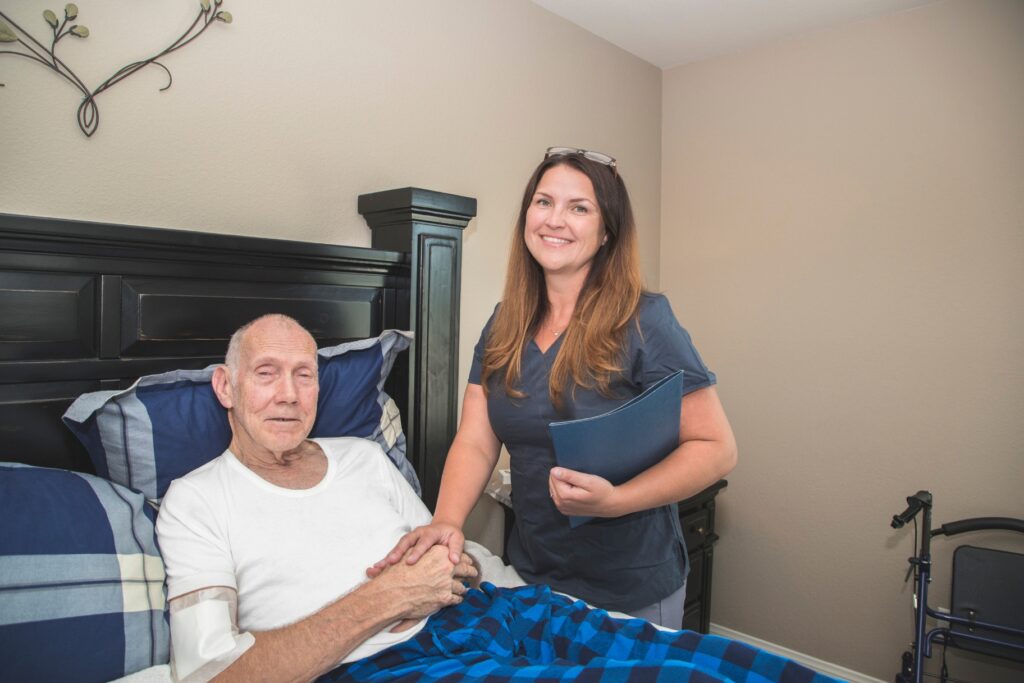How to Care for Seniors with Parkinson’s Disease
April is recognized as Parkinson’s Awareness Month and is the birth month of James Parkinson, whose work led to recognition of the medical condition. This is a good time to bring awareness to its symptoms and offer suggestions on how to support seniors affected by Parkinson’s disease.
At Arosa, we advocate and support seniors and their family members. We have had the opportunity to work with several patients with Parkinson’s disease. Joy has been a client for over 10 years and Arosa has been able to help provide caregivers to support her daily needs and ensure her safety due to her advanced physical limitations. Her caregivers have remained the same over time allowing for a more personal touch and feeling of comfort. Our care managers have been able to support Joy and her family through this journey and provide guidance and advocacy through innovative treatments over the years, all while aiming to help her maintain as much independence and autonomy as possible. Parkinson’s progression can be quite challenging to the patient as they lose mobility, but it also has a significant emotional impact to the individual and can lead to depression and mood changes.

What is Parkinson’s disease and what are its symptoms?
Parkinson’s disease is a neurological disorder that affects the bodily movements of an individual. It occurs when the brain cells that produce dopamine, a chemical that helps control muscle movement, begin to deteriorate. It is estimated that about 500,000 people in the United States are diagnosed with Parkinson’s disease, with about 50,000 new cases each year. Parkinson’s disease is more common in seniors.
The symptoms of Parkinson’s disease can vary from person to person. Some common symptoms include tremors, stiffness, slowness of movement, and difficulty with balance and coordination. These symptoms can significantly impact a senior’s ability to perform daily activities, leading to a decreased quality of life. In addition, Dr. Charles Davis states that about 30% of patients may show severe signs of dementia in the later stages of the disease. Symptoms of Parkinson’s disease dementia (PDD) include depression, anxiety, and psychotic behavior.

Tips for managing Parkinson’s in seniors.
Although there is no cure for Parkinson’s disease, there are treatments to help manage its symptoms. Medications such as levodopa, can help to increase dopamine levels in the brain, reducing the severity of symptoms. However, caregivers should monitor side effects of levodopa, such as anxiety, insomnia, dyskinesia (rapid involuntary movements of the face, arms legs, or trunk), and motor fluctuations (intervals marked by a positive response to levodopa, and periods marked by a reappearance of parkinsonian symptoms). It can also lead to compulsive behavior such as gambling or overeating. A modification in the dosage of levodopa may be all that is needed to reduce the side effects. Always consult a doctor.
In addition to medical treatment, seniors with Parkinson’s disease may benefit from lifestyle modifications, such as a healthy diet and regular exercise. A low-protein diet may help lower fluctuations in the brain’s dopamine level. Exercise and physical therapy are beneficial in maintaining mobility and improving balance. Dr. Ahlskog warns of the dangers of patients over 60 not getting enough exercise, “Once patients develop sedentary lifestyle due to PD, it is difficult to reverse bad habits and deconditioning”. In a study completed by Baskaran, subjects were found to improve their gait and posture significantly after walking on a treadmill 3 times a week for 6 weeks.
Mentally stimulating activities and social support can help manage the disease’s emotional impact. Also, regular visits to the psychologist may help manage the symptoms of dementia.
Overall, Parkinson’s disease can have a significant impact on a senior’s life, but with appropriate treatment and support, it is possible to manage its symptoms and maintain a good quality of life. It is essential for seniors and caregivers to work closely with healthcare professionals to develop a personalized treatment plan that meets their individual needs.

Experts on Aging
Arosa’s integrated model ‘elevates care’ through the formation of teams, which consist of care professionals (caregivers, care consultants, care managers, and care specialists), who work together to craft and implement tailored care plans for clients and their families. Many of these teams have served the local communities for years (if not decades) and offer invaluable knowledge to clients and families throughout life’s aging journey.
In addition to its dedicated caregiving workforce, Arosa employs over 70 care managers in 31 office locations. These certified professionals are experienced in a variety of fields that focus on issues related to aging and/or disability; many of whom are credentialed in gerontology, social work, mental health, nursing, physical therapy, and psychology.
Sources:
Ahlskog, J.E. (2010). “Seniors with parkinson’s disease: Initial medical treatment,” Journal of Clinical Neurology, 6(4), p. 159-166. Retrieved from: https://doi.org/10.3988/jcn.2010.6.4.159.
Ahlskog, J.E. (2011). “Cheaper, Simpler, and Better: Tips for Treating Seniors With Parkinson Disease.” Mayo Clinic Proceedings, 86 (12), p. 1211-1216. Retrieved from: https://doi.org/10.4065/mcp.2011.0443.
Baskaran, Deepika. (2017). “Real-Time Feedback Training to Improve Gait and Posture in Parkinson’s Disease.” A Thesis Presented in Partial Fulfillment of the Requirements for the Degree Master of Science. https://keep.lib.asu.edu/_flysystem/fedora/c7/187456/Baskaran_asu_0010N_17477.pdf
C. P. Davis, M.D. (2021) Parkinson’s disease: Symptoms, treatment & life expectancy, eMedicineHealth. eMedicineHealth. Available at: https://www.emedicinehealth.com/parkinson_disease_dementia/article_em.htm (Accessed: March 19, 2023).
Dyskinesia. (no date). Parkinson’s Foundation. Retrieved from: https://www.parkinson.org/understanding-parkinsons/movement-symptoms/dyskinesia (Accessed: March 19, 2023).
Gazda, J. (2023). Email Interview with marketing. Arosa Care.
Tyler, B. (2022) “Parkinson’s Awareness Month” Parkinson’s Awareness Month. Retrieved from: https://dhhs.ne.gov/Pages/Parkinsons-Awareness-Month.aspx



